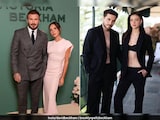PM Narendra Modi said a poor man's son through his hard work is trying to improve the economy
Maharajganj, Uttar Pradesh:
Days after Nobel laureate Amartya Sen's criticism of his demonetisation move, Prime Minister Narendra Modi today delivered his riposte at an election rally in Uttar Pradesh's Maharajganj - hard work is more powerful than Harvard. The dig comes a day after GDP data showed that the overnight ban on 1,000 and 500 notes in November did not affect growth rate as hard as economists had predicted.
"There are those (critics of note ban)... people from Harvard, Oxford... great economists... those who predicted that the GDP will go down two per cent or even four per cent... but the nation has seen how Harvard thinks and how 'hard work' thinks," the Prime Minister said, addressing a large gathering in Maharajganj, around 300 km from Lucknow.
"On one hand are those from Harvard, who speak in the name of Harvard, and on the other hand is a poor mother's son who is trying to transform the economy of the country through hard work," he said to wild cheering from the crowd.
Data released yesterday showed that despite the notes ban, India's economy clocked a much better-than-expected growth rate of seven per cent in the December quarter, cementing its place as the fastest growing economy. Economists polled by Reuters had forecast 6.4 per cent growth for the October-December period.
Amartya Sen, Professor of Economics and Philosophy at Harvard University, had recently called the notes ban an "unguided missile fired unilaterally without regard to democratic norms". He also described it as a "despotic action that has struck at the root of economy based on trust".
The notes ban, which wiped out 86 per cent of the cash in circulation and left millions scrambling for cash at the fag end of the year, was pitched as a colossal step to choke tax evaders.
Union Finance Minister Arun Jaitley said the GDP data "belies exaggerated claim" by many that rural sector was in distress. "I had consistently maintained that revenue figures indicated that growth was there, and that some cash-dominant areas would be impacted," he said.
The Congress has questioned the data released by the government, with senior leader Anand Sharma calling it "surprising and highly suspect".
"There are those (critics of note ban)... people from Harvard, Oxford... great economists... those who predicted that the GDP will go down two per cent or even four per cent... but the nation has seen how Harvard thinks and how 'hard work' thinks," the Prime Minister said, addressing a large gathering in Maharajganj, around 300 km from Lucknow.
"On one hand are those from Harvard, who speak in the name of Harvard, and on the other hand is a poor mother's son who is trying to transform the economy of the country through hard work," he said to wild cheering from the crowd.
Data released yesterday showed that despite the notes ban, India's economy clocked a much better-than-expected growth rate of seven per cent in the December quarter, cementing its place as the fastest growing economy. Economists polled by Reuters had forecast 6.4 per cent growth for the October-December period.
Amartya Sen, Professor of Economics and Philosophy at Harvard University, had recently called the notes ban an "unguided missile fired unilaterally without regard to democratic norms". He also described it as a "despotic action that has struck at the root of economy based on trust".
The notes ban, which wiped out 86 per cent of the cash in circulation and left millions scrambling for cash at the fag end of the year, was pitched as a colossal step to choke tax evaders.
Union Finance Minister Arun Jaitley said the GDP data "belies exaggerated claim" by many that rural sector was in distress. "I had consistently maintained that revenue figures indicated that growth was there, and that some cash-dominant areas would be impacted," he said.
The Congress has questioned the data released by the government, with senior leader Anand Sharma calling it "surprising and highly suspect".















